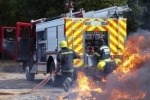Crisis Preparedness: Making a Plan
Is your congregation prepared for a crisis? Do you have a written, easy to access guide for dealing with a crisis? Are your staff and congregational leaders familiar with/trained to deal with a crisis should it arise?
This collection of resources may be a place to start. Linda Grenz, canon to the ordinary in the Diocese of Rhode Island and founder of LeaderResources offers this list of things to consider when developing an crisis plan:
- Who do you call? (e.g., the bishop/diocese, wardens, close colleagues, etc.)
- What community resources are available for different situations?
- What do you do or not do?
- Think ahead about what you might need (e.g., photo nametags for clergy and other caregivers -- something 815 cobbled together quickly after 911 but is worth doing ahead of time to help police know who is legit)
- Stockpile some supplies (I noticed that someone got bottled water to everyone in Newtown and I've seen that elsewhere. Tissues is another common item.)
- Include sample statements and press do's and don'ts. We can't assume that the clergy/laity in a local church know what to say or not say.
- Talk about how to interact with the press and public in a way that proclaims the Gospel. Some clergy are good at this on the spot -- others....not so good. One of the training bits I did when I taught baby bishop school was to make them respond to a crisis situation when the TV reporter shoves a mike in their face and asks them a question. That's one thing some of them still mention to me many years later as being helpful. Role playing that a few times with different scenarios helps get something in your head so when it happens, you aren't thinking about it for the first time.
- How might you organize an interfaith service? What might you offer from the Episcopal tradition?
- Where do you find ongoing help for victims, survivors, caregivers, etc.
- Where do you find funding sources for different needs? Most clergy aren't aware of what's available or how to access it.
- How do you prepare in advance? Few churches do routine risk assessments (When were your fire extinguishers last updated? Do you have an open door policy that leaves staff vulnerable -- do you even have a panic button they can press? A checklist would help)
- Do you do any training: fire drills, talk about how to keep safe, etc. Do you know where you'd find a locked room to hide kids in if it happened in your church? Where would you go? What would you do?
Additional Resources
From Episcopal Relief & Development:
From National Disaster Interfaiths Network:
Elsewhere on ECF Vital Practices:
ECF Vital Practices invites you to share resources that you've found helpful in the Comments section below.






